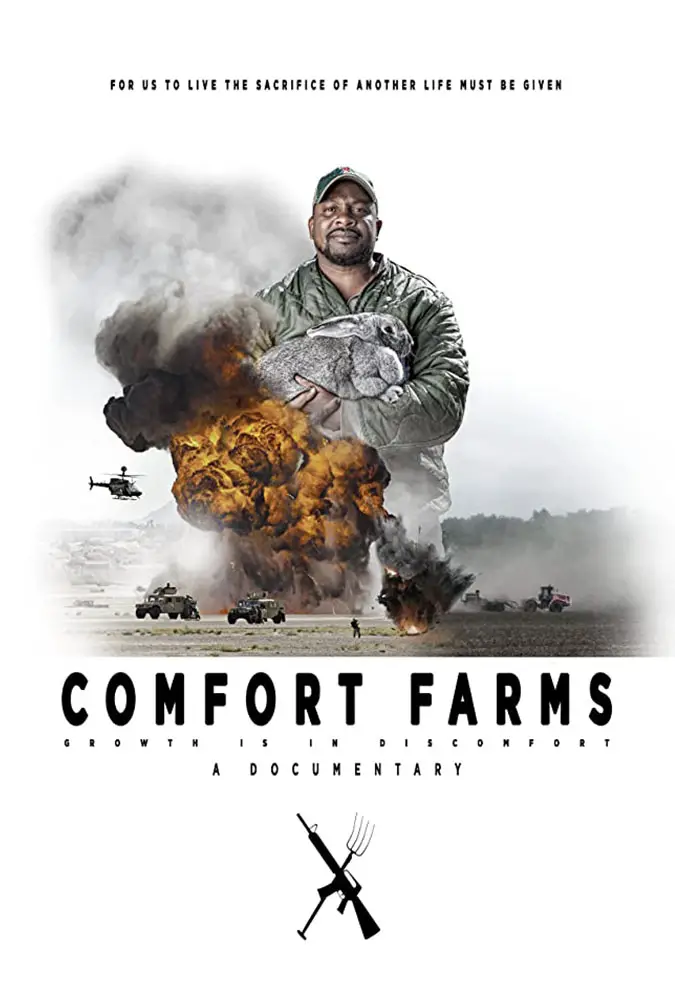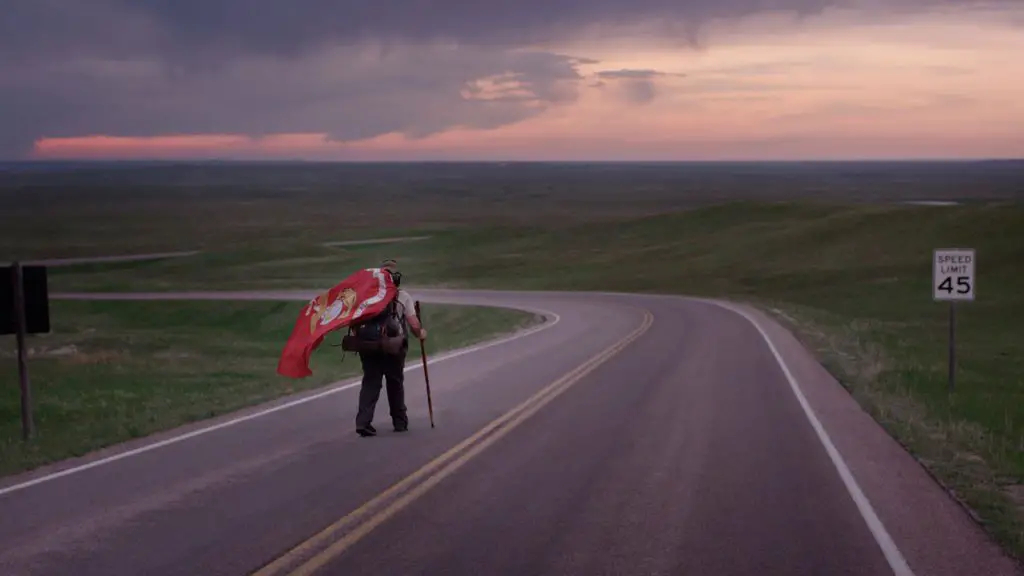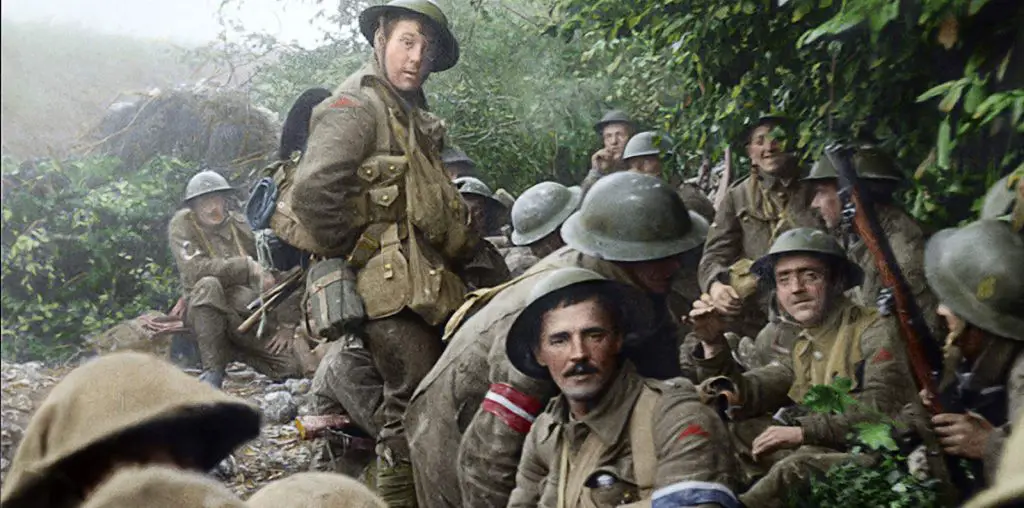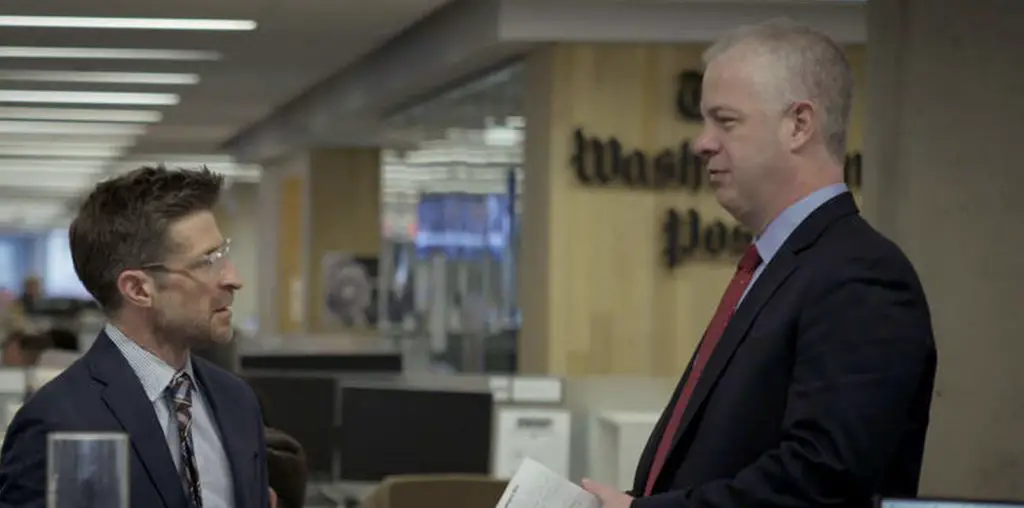
Comfort Farms purportedly is about a unique therapy program for veterans. I say purportedly because the spark and evolution of the farm are not brought up until around 35-minutes in this 77-minute long documentary. That means that roughly the first 45% of the film does not focus on its stated premise. Quite frankly, there would be nothing wrong with that if the set up was especially captivating, engaging, interesting, or relevant.
Sadly, that is not the case. To be clear right out the gate, writer-director Carlisle Kellam has noble intentions with his feature-length debut. He interviews several generations worth of veterans to create a holistic overview of how resources for treating trauma and reintegration available to the men and women of the armed forces have evolved. This is something that needs to be explored, and nothing I say in terms of the technical qualities of the film should diminish the stories, heroism, and bravery of the people interviewed here, the soldiers still in the thick of it, and their fallen comrades.

“…in 2014, former Army Ranger Jon Jackson hit upon the idea to use agriculture farming…to help veterans maintain a structured routine…”
But, Kellam gets too wrapped up in chronicling each story, as he puts it, in their own words. This means that Comfort Farms never looks at the big picture of all veterans. It narrowly focuses on the people that the Comfort Farms therapy is helping. How did they discover this therapy? What of the veterans that this sort of outlet does not help? What made these people join the military to begin with? None of these questions are explored.
But, the big question on your mind must be: what is Comfort Farms exactly? As the audience eventually learns (at the 34-minute and 28-second mark to be exact), in 2014, former Army Ranger Jon Jackson hit upon the idea to use agriculture farming and a sustainable lifestyle (“if you can’t kill it, maybe you should not eat it”) to help veterans maintain a structured routine in daily life. Exactly how this inspiration struck remains obtuse at best, but as he was in this predicament, he realized that other veterans must be in similar situations. So, he starts up Comfort Farm, named after his fallen army buddy Captain Kyle Comfort.
Now, to be fair to the film, interspersed through all the interviews and archival war footage, there are scenes of the veterans working on the farm. But, as the farm has not been established or explored yet, it is all somewhat confusing and nonsensical. Why is there a bagpipe processional through the woods surrounding the farm? What do the late-night bonfire laments mean in the context of both the farm and the veterans on a personal level? Understanding these elements does not come until over halfway though they are present for almost the entire time.

"…roughly the first 45% of the film does not focus on its own stated premise."



I normally wouldn’t respond to something like this, but I believe the nature of your review demands that I do. Right out of the gate, I’ll say that this is not meant to be an argument that you or anyone else is not entitled to an opinion. Or, for that matter, not entitled to think our film is objectively bad. Nor am I writing this to try and change your mind. And I’m certainly not writing this as an attack on you. You may be generally a great film critic. I don’t know. And I welcome critiques wholeheartedly. I take creative risks and expect some people to dislike what I do. Or, in your case, to outright hate it. So my problem is not that you think our film is bad or that you gave it a bad review. My problem is how disrespectfully you go about it. But please bear with me, by disrespectfully I don’t mean what might first come to mind…
By disrespectful, I don’t mean you were disrespectful by choosing to dislike the parts of the film you disliked or how roughly you went about pointing those things out (although I do believe you were a tad nasty when you needn’t have been.)
But by disrespectful I mean in these ways:
To me as a filmmaker and to the veterans.
First: You’re disrespectful to me as a filmmaker. Let me explain what I mean by that. Essentially, your review is disrespectful because it’s -ironically – quite sloppy. If you’re going to review something that takes the time and energy of a film, have the courtesy of doing it with a little respect – especially something that deals with a topic like suicide. I’m not trying to play that card and say the film deserves special passes because veterans are in it. For all I know you are a veteran. I’m simply saying it makes your sloppiness a little more grievous. Again, it’s fine that you didn’t like the film. It’s fine that you think it was objectively bad. It’s fine that your language is harsh and blunt. That’s not my gripe. Those things are not what I’m referring to as disrespectful.
But these things are:
To begin with there are a number of things in your review that are just factually wrong. You can of course make the argument that it was my sloppy filmmaking that made these facts unclear. But I find that hard to believe when nearly 100% of the people it’s been test-screened for picked up on all of these things with no trouble. For example, where did you get the idea that the food slaughtered on the farm is only for their own use? It’s absolutely not. It’s mentioned over and over that the food is grown and raised to support the local community. And what in the world is an Air Ranger? You highlight this quote in your review:
“…in 2014, former Air Ranger Jon Jackson hit upon the idea to use agriculture farming…to help veterans maintain a structured routine…”
Where in the world did I say or emphasize that? …And I could go on and on.
You suggest my choices were in fact ignorant or sloppy mistakes. You say the film is “purportedly” about Comfort Farms, suggesting the film is not even about what it’s supposed to be about. Since when did a film have to be only about it’s title? Or for that matter how often is every thread and essence captured in a logline? It’s all over the press notes that Comfort Farms is not just about Comfort Farms or it’s founder, that it’s broader than that. It’s also all over the notes that this was never intended to be an information piece about the workings of the farm. It seems like you reviewed the movie you expected to see, instead of taking the time to review the movie the way it was made. You say: “But, Kellam gets too wrapped up in chronicling each story, as he puts it, in their own words. This means that the film never looks at the big picture of all veterans. It narrowly focuses on the people that the Comfort Farms therapy is helping. But what of the veterans that this sort of outlet does not help? What makes people join the military, to begin with? None of these questions are explored:.”
So what? That’s not what the movie is about, who gave you the idea it was?
If you want to get strictly technical, why does it matter that the farm comes in two-thirds of the way into the film if the farm isn’t the entire essence of what the film’s about? Is it essential to the overall plot, yeah. But it’s not THE plot. I understand quite clearly the three act structure and all of its workings. I studied it. I’ve taught it. Does this film perfectly fit it? I’d say no. But not for the reasons you suggest. And certainty not because of what you suggest. Jon and the farm are not meant to be the break into act two or the inciting incident or whatever plot point you’re looking for. I went through a number of edits before I decided to structure the film the way you saw it. Again that doesn’t justify my decision or necessarily make it a good one. And must you like it? No. Of course not. But was it done sloppily without purpose or intent? Absolutely not. The same can be said for my framing and lens selections for the interviews. Is it unique and imposing? Yes. Will some people dislike the choices? Of course some will as you’ve demonstrated. But again my choices were made with purpose and intent with respect to how I saw the theme. Far from the sloppy accidents you suggest. Does that make them good choices? Maybe or maybe not. But it certainly makes them the opposite of “sloppy.” So if I’m a bad filmmaker, that’s fine, but please give me the credit of being bad by purpose, not by accident.
Second and perhaps most importantly: You’re disrespectful of the veterans. Toward the end of your review you say something like “next time go talk to some real veterans.” What makes you think these aren’t real veterans? I would say a combat infantryman who served 1944-46 in the Philippines would qualify as a real veteran. I’d also think 6 tours in the Middle East finishing up with the 75th Ranger regiment would too. As would several run-ins with IEDs while deployed with the 82nd Airborne. And on and on. Many “real” veterans never see a day of combat. What makes a veteran a real veteran and why would you speak so judgmentally?
Over all I just don’t get it. But I guess that’s fair. You don’t get the film. I don’t get your review. You say it’s the “pure distillation of superficial,” I say the same about your review. But please, with the next filmmaker, and I say this with all due respect, don’t be so rude and sloppy.